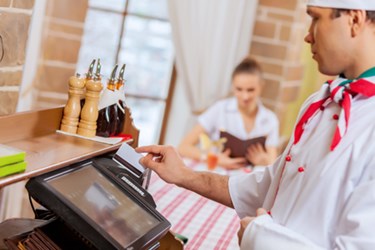Restaurant And Hospitality IT News For VARs — October 11, 2013

By Anna Rose Welch, Editorial & Community Director, Advancing RNA

In the news this week, the Restaurant Performance Index declines, a study shows slow progress in mobile wallet adoption, and drive-thru performance is slower with more complex menu items, despite technology advances.
Expectations Indicators To Blame for August’s RPI Decline
For the third consecutive month, The National Restaurant Association Restaurant Performance Index (RPI) for August declined from July’s level of 100.7 to 100.5. The current situation index stood at 100.7 for August, up 0.6 from July, and was the first increase in three months. A majority of restaurants reported positive same store sales and increased customer traffic from July. The expectations index at 100.4 for August (down .9 from July) still shows operator optimism is somewhat dampened compared to other months. According to Hudson Riehle from the National Restaurant Association, the dip in expectations indicators was the primary reason for August’s RPI decline.
Study Says Mobile Wallets Slow To Catch On
According to the Phoenix Marketing International Credit Card Monitor Study, while 70 percent of smartphone owners are aware of mobile wallets, only 20 percent show an interest in using one. The study also found that a majority of mobile wallet users preferred PIN based transactions over near field communication (NFC) or QR code scans. When considering a mobile wallet, prospective users were more likely to consider opening one through their current banks.
Drive-Thru Times Are Slower Despite Technology Advancements
The QSR Magazine Drive-Thru Performance Study examined the innovations and successes of the six, best performing permanent brands — Burger King, Chick-fil-A, Krystal, McDonald’s, Taco Bell, and Wendy’s. According to the results, several of the benchmark QSR chains experienced their slowest average speeds of service. However, considering that QSRs are offering more complex menus and healthier meal options, food preparation “isn’t so simple anymore.” Busier drive-thru lanes have also slowed timing, with the average number of cars in line having increased since 2012. While restaurants have made technological improvements to improve speed, evolutions towards more complex menus, among other factors, suggest that speed of service times may not reach past levels.
Hotels Battle Internet Comparison Shopping
New York Times reporter, Julie Weed, addresses the rising number of comparison shoppers in the hotel market. With the rise of more powerful Internet search and comparison tools, many customers book rooms only to cancel them once a cheaper option appears. Weed’s article explains that, in light of this trend, many hotel companies are offering online shoppers lower, nonrefundable rates when they reserve a room and pay in full. Researchers have found that hotels stand to lose up to 2 percent of their net revenue because of the price declines following cancellations.
Hospitality IT Talking Points
Mary MacVean for the Los Angeles Times reports that, despite QSRs’ attempts to provide healthier items, nutritional values for entrées have not changed much. According to researcher Helen Wu, whose study appears in the Journal of the Academy of Nutrition and Dietetics, implementing lower calorie/sodium items “has been a one-step-forward-one-step-back process.”
Marie Grosse for Business 2 Community argues that a mobile app is the best way to guarantee personalized offers and sustained consumer participation in a loyalty program. What defines a strong loyalty program is not so much high recruitment but sustained consumer participation, according to Grosse. While many loyalty programs fail to provide personalized offers to customers, she claims that a mobile app can more closely analyze a person’s SoLoMo (Social, Local, Mobile) behavior.
Jack Philbin for VentureBeat argues that retailers should focus on the organizational, non-payment side of mobile wallets to build relationships with consumers and boost loyalty and sales. This approach goes hand in hand with recent research revealing that consumers are searching for solutions to better organize their phones.
BCF president Art Webb has written a four-part article outlining the “Ten Essentials Of Building Productive Travel and Hospitality Brands.” This series elaborates upon the importance of the consumer and business in creating a brand, how to know if a brand is right, and making it bank.
Russel J. Sapienza for the Huffington Post claims that consumers remain skeptical about mobile wallets because of security concerns. According to Sapienza, consumers are eager for more significant defensive measures to amp up security. Similarly, consumers claim they’d be more likely to leave behind their physical wallet if mobile wallet technology was more widespread.
